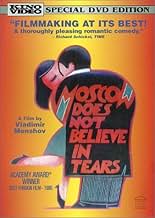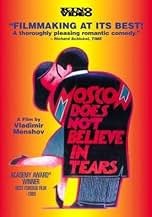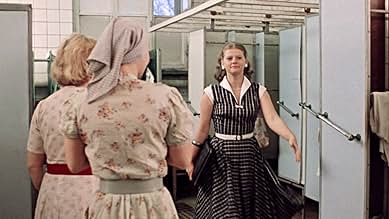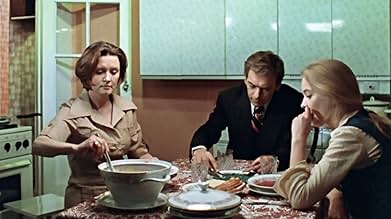PUNTUACIÓN EN IMDb
8,0/10
15 mil
TU PUNTUACIÓN
Esta es la historia de la vida de tres novias desde la juventud hasta el otoño. Sus sueños y deseos, el amor y las decepciones.Esta es la historia de la vida de tres novias desde la juventud hasta el otoño. Sus sueños y deseos, el amor y las decepciones.Esta es la historia de la vida de tres novias desde la juventud hasta el otoño. Sus sueños y deseos, el amor y las decepciones.
- Dirección
- Guión
- Reparto principal
- Ganó 1 premio Óscar
- 3 premios y 1 nominación en total
Vladlen Paulus
- Pyotr Lednev
- (as V. Paulus)
Reseñas destacadas
Moscow Does Not Believe In Tears is an appealing comedy-drama with much to say about Soviet society from the 1950s to the 1970s. The cast deliver standout performances, and this is the film's greatest strength. The story is about their lives. The city's scenery is often featured, with cinematography that's good for a Soviet drama film. The score, however, is standard fare, but there are a few notable songs. Considering its high entertainment value it's no wonder that Moscow Does Not Believe In Tears became one of the most popular films in the Soviet Union. It even won an Academy Award for Best Foreign Language Film in 1980. It's just one of those films where everyone involved in making it contributed to a result that delivers on all fronts. If the acting or the direction was worse then the result could have been another forgettable drama. Soviet filmmakers, however, specialized in drama films. This is because of the restrictions that were put on them by the government. Many good dramas were released during the Soviet period, and Moscow Does Not Believe In Tears is one of the most memorable. I definitely recommend seeing it.
Moving story of three young girls who come to the capital of Soviet Russia in search of their fate. They play rich girls to impress the guys, and succeed in doing so. Katya (the protagonist) does not like the game, but still goes with the girls. But the truth is soon revealed, and Katya's boyfriend breaks up with her. She is pregnant and has to raise a kid alone in a tiny dorm room, and still try to get an education.
The second part shows the three girlfriends 20 years later. Katya is a very successful business lady and has a wonderful daughter. But she hasn't found real love, and the story takes a new turn when she meets Gosha in a train. They both now have to find ways into each other's established lives. A very nice and sincere story that people watch over and over again!
The second part shows the three girlfriends 20 years later. Katya is a very successful business lady and has a wonderful daughter. But she hasn't found real love, and the story takes a new turn when she meets Gosha in a train. They both now have to find ways into each other's established lives. A very nice and sincere story that people watch over and over again!
Culturally interesting since this occurs in a Communist country that US propaganda gave little insight on the values and realities of the people. We see idealistic poets who say the older generation made mistakes, women promoted to executive positions, a film produced by the State yet approaching sexual themes, Western idolization, the drudgery of repetitive industrial work, and class distinctions between the haves and have-nots.
Also of interest is the protagonist's view of herself. Without revealing plot twists, it is suffice to say that a woman is socially seen as submissive to the man. This is a shock to Western sensibilities of women's equality, especially as we see her ordeals as a result of a man's selfishness and dominance. What is revealing is that she, herself does not rebel against the System. She works within the parameters, creates her own success, and becomes transformed.
Being Western, I found myself questioning whether she had truly achieved something. The crown of achievement, we are taught, is independence, equality. Whereas she achieved that in a career and in her lifestyle, in her heart, she yearned for a man, to be the little wife, and to submit herself to a patriarchal marriage. But, in the end, who are we to judge another's happiness?
Also of interest is the protagonist's view of herself. Without revealing plot twists, it is suffice to say that a woman is socially seen as submissive to the man. This is a shock to Western sensibilities of women's equality, especially as we see her ordeals as a result of a man's selfishness and dominance. What is revealing is that she, herself does not rebel against the System. She works within the parameters, creates her own success, and becomes transformed.
Being Western, I found myself questioning whether she had truly achieved something. The crown of achievement, we are taught, is independence, equality. Whereas she achieved that in a career and in her lifestyle, in her heart, she yearned for a man, to be the little wife, and to submit herself to a patriarchal marriage. But, in the end, who are we to judge another's happiness?
Being of Russian descent and a first generation Australian, I first saw this film in the original Russian a year or two after it came out. At the time I thought it was one of the funniest things I had seen in a long long time. I saw it again when our World Movie channel broadcast it and I laughed just as hard and just as long. To understand the comedy in what appears to be a story of feminist angst you need to be Russian. There is no other way to see it. We don't see that the supposed conflict between between the heroine and her lover is that she is a manager and he is not. It's much more primal than that. It is because she EARNS more than he does. Women held managerial positions in the USSR since they first began driving tanks and tractors during the second world war. Most of us are brought up to believe that we can do just about anything, and a lot of the time we have to. So please, if you see this film, remember to laugh. Remember that Yes, Russians aren't happy unless they're miserable but the story of this film is also about the joy of rebuilding lives and relationships for both men and women and about the triumph of the human spirit over seemingly impossible odds.
If you try to understand the meaning of Soviet mode of life (especially place of woman in Soviet society), this film represents the best one you can find for this purpose. The destinies of three women are depicted in clear and awesome way, and the most important you can see is that whatever happens in life, try to be optimist and to do everything not to give up living and being happy.
¿Sabías que...?
- CuriosidadesOne of four Russian films ever to win Academy Award for Best Foreign Language Film. The other are Austerlitz (Guerra y paz 1ª parte) (1965), Dersu Uzala (El cazador) (1975) and Quemado por el sol (1994).
- PifiasWhen Lyudmila and her friend approach the office building she is wearing a pair of white shoes. Once inside the building the shoes color changes to black.
- Citas
Lyudmila Gurina: Don't cry.
Lyudmila Gurina: You know what Moscow thinks of tears.
Lyudmila Gurina: We shouldn't be sitting around, we should do something.
- ConexionesFeatured in Lyubov i golubi (1985)
- Banda sonoraAleksandra, Aleksandra
Written by Sergey Nikitin and Dmitry Suharev and Yuri Vizbor
Performed by Tatyana Nikitina and Sergey Nikitin
Selecciones populares
Inicia sesión para calificar y añadir a tu lista para recibir recomendaciones personalizadas
- How long is Moscow Does Not Believe in Tears?Con tecnología de Alexa
Detalles
- Fecha de lanzamiento
- País de origen
- Sitio oficial
- Idioma
- Títulos en diferentes países
- Moscow Does Not Believe in Tears
- Localizaciones del rodaje
- Empresas productoras
- Ver más compañías en los créditos en IMDbPro
Taquilla
- Presupuesto
- 900.000 US$ (estimación)
- Recaudación en todo el mundo
- 217 US$
- Duración
- 2h 30min(150 min)
- Relación de aspecto
- 1.37 : 1
Contribuir a esta página
Sugerir un cambio o añadir el contenido que falta






































